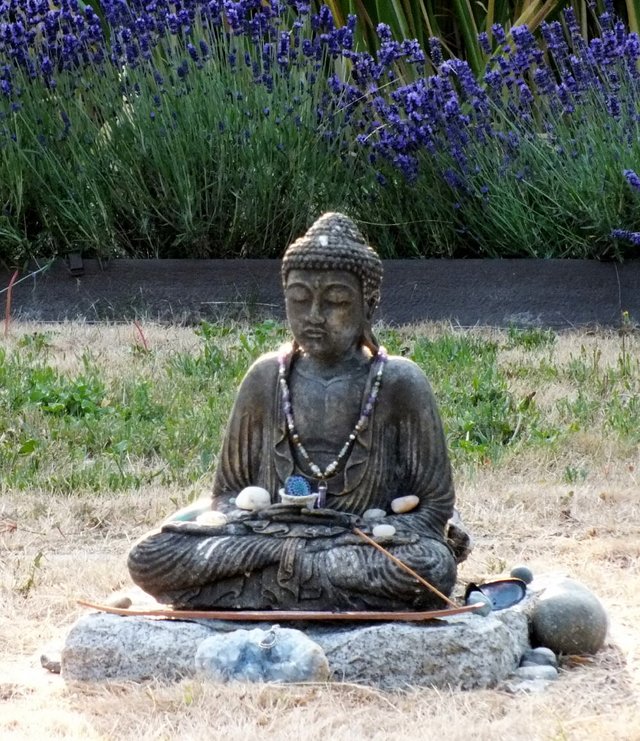The Eternal Assigning of Blame, Right and Wrong... and Finding Actual SOLUTIONS!
Even people who are quite self-aware encounter those moments when they lapse into the old-fashioned blame game.
When I say "Blame Game," I mean those times where establishing who is right and who is wrong suddenly becomes of far greater importance than actually solving any problem we might be facing.
What is Your Objective?

Buddha in the garden
I sometimes watch Mrs. Denmarkguy and our 27-year old daughter have "heated debates" that typically end with someone storming off with hurt feelings. This, in spite of the fact that both are quite "evolved" and conscious beings, in their own way.
As a long time observer of this dynamic, so many of their struggles seem rooted in their attachment to the idea that someone MUST be "right" and someone MUST be "wrong." As the situation escalates, what unfolds becomes more a contest of debating skills than an attempt to resolve differences.
Of course, in the greater world the danger of that is that people get so wrapped up in their own stories that nothing ends up being resolved. There is not even an agreement to "agree to disagree," just hostile feelings simmering in the background.
Should I poke my nose into the situation and have the "audacity" ask something like what they were hoping to achieve, the answer might be something like "I want her to admit that I am RIGHT!"
Makes me ponder the many fights and disputes we have in the world...
83% Solutions and 9% Apologies
If you have more than even the most rudimentary grip on the realities of the world, you'll have realized that life is an imperfect place. Things are rarely going to turn out "100% your way."

Lilacs in bloom
In viewing and coming to grips with these imperfections, what many fail to consider that life's problems do not have "all or nothing" solutions, so the problem actually begins with our expectations.
Alas, our egos easily become very attached to our perceptions of a situation... and the inherent challenge-- when we make the deliberate choice to "live consciously"-- is to not allow ourselves to "put blinders on" every time our ego feels challenged by the possibility that someone else might have a good idea, and we might not be "as right" as we'd like to think.
One of the things that has helped me a lot in life is to "own my share."
That means making peace with the fact that where a compromise ends might feel like an "83% solution" to me, rather than perfect. But is arguing for that last 17% really worth it? Most likely not, so I let it go.
The "9% apology" is a different beast, that goes back to our strange need to assign blame. Life becomes a lot easier when I step up and openly accept responsibility-- and potentially apologize for-- the part of a situation for which I am accountable. Even if it's only a tiny portion... like 9%. Even if I am only a tiny bit at fault, my owning that tends to open a door for others to take ownership of their part of the problem
Compromises, Perceptions and things...
Of course, most people will argue that they are good at compromising.

Northern sunset
Alas-- on deeper examination-- many people's interpretation of compromise effectively comes closer to a "Let's discuss this... and then we do it MY way" philosophy.
If you think about it, though... when we bring a "problem" to the table, what we're really bringing is a "set of perceptions" filtered through our individual lenses of experience and in most cases the different parties to the "debate" have valid points-- from their perspective.
And so, we end up back the the question "What is TRULY your objective?" Do you want to actually find a solution to a problem, or do you merely want to "win a debate?"
Typically, the desire to "debate" is really just a cover over someone's fear that their deeper needs are not going to be met. So rather than simply argue back, maybe a better approach would be to simply ask the question "What is it you want the outcome to be, in this situation?"
Often that stops the "debating," and instead we can enter a problem solving discussion centered around what each person wants, rather than pointing out how other people are "wrong."
Don't Bring me Problems, Bring me Solutions
Many moons ago, a person I worked with-- one of my managers-- used to always tell people around him "Don't bring me problems, bring me solutions!"

Blooming lavender
The bottom line of that statement was that his office door was always open to his employees, and he was extremely forgiving and almost never found the need to "blame" anyone for their mistakes and screw-ups. However, that openness and forgiveness came with a "price," namely that he expected people to be "empowered in their own situations."
In other words... if I had an accident in the delivery truck, it would not make him angry, as long as I would show up and say "I had an accident in the delivery truck... but I called the customers and told them their shipments would be late, and the truck towed to maintenance."
Staying in a place that is "solution oriented" rather than "problem oriented" can often make discussions of differing viewpoints and opinions move much more easily.
How About You? Do you find yourself wanting to assign blame to people? Is it important to you to establish who is "right" and who is "wrong" in a situation? Are you good at compromise? Do people who have radically different viewpoints from you scare you, or get you defensive? Are you a good problem solver? Is it more important to you to find resolutions, or to win debates? In either case, WHY? And what are your objectives? Leave a comment-- share your experiences-- be part of the conversation!
 Animated banner created by @zord189
Animated banner created by @zord189
(As usual, all text and images by the author, unless otherwise credited. This is original content, created expressly for Steemit)
Created at 180117 10:45 PST
For me, I don't look for who is right or wrong in a debate because most of the time it's pointless. I sure sometimes have that inner voice "I'm right about this how cant you see that?!" but instead I try to focus on the subject, problems or behaviours, not people. Nobody likes to be blamed and get defensive so It often backlashes. I myself can get defensive as well but even if I realize it in a discussion, it's hard to go back and accept it! I try my best :) So, solution is the most important thing, not winning debates! Because you can always face with the similar problem again and again in your life. Finding the source of the problem and focusing on it is the best solution I apply.
My sentences are all over the place but I hope ı could express myself. Thank you for the well written post, I questioned my position on discussions one more time :)
Well said you lady, I can see wisdom and prudence is your friend.
You made me very happy with your kind words, thank you @drsinmongwong :)
Seemed perfectly clear and reasonable to me @birdlover. And it sounds like you have a pretty healthy and balanced approach to the whole issue. "Being RIGHT" used to be important me back in my early 20's when (ironically!) I thought I knew a LOT. Now I know that I know less, and it matters less who's right or wrong... I just want to reach an outcome that seems most beneficial; to the greatest number of people.
I'm glad it did! Being able to say "I know nothing" and act accordingly is such a great way to pass dignity to others, be a good example and actually prove your point. However I believe this attitude also can be learned through others and different experiences. It's beautiful that you critize and understand different stages of your life. It's great way to be in peace with yourself, with others, with your experiences and the world itself. I love your discussion posts and how you encourage discussing and being a part of the conversation in the comments! I check most of them and add my contribution where I can :)
Beautifull
i think its a great post....i am excited and impressed to see your post..... i waiting for your next post....i wish for your best of luck brother
Absolutely brilliant post. I've lately found that taking responsibility for things I've done wrong or even things that I don't feel I've done wrong that have simply made others feel wronged, apologizing, and trying to be as honest as possible have truly improved the quality of my life.
In so many areas, its important to be solutions oriented. It is important for settling disputes and solving all kinds of problems. It seems that there are too few people that are even looking for solutions. Those willing and able to find them are some of the most special people.
I think we have lost the art of dialogue. We no longer communicate to be understood but rather to be right. We have gotten into the horrible habit of assuming if and when someone doesn't agree with us they are somehow horribly misguided and in some cases people get aligned into the category of human garbage.
We rarely take the time to understand a topic from both sides but merely create for ourselves an echo chamber and generally only engage in the things and resources that affirm our world views and opinions thus we never really question our own beliefs and why we believe them to be true and in extension are less than gracious with other's views.
Do you find yourself wanting to assign blame to people? It depends, if the person doesn’t recognize his/her mistake then I do try to make it clear
Is it important to you to establish who is "right" and who is "wrong" in a situation? Again, it depends on how important the situation is
Are you good at compromise? Yes
Do people who have radically different viewpoints from you scare you, or get you defensive? Not at all
Are you a good problem solver? I think I am
Is it more important to you to find resolutions, or to win debates? Solutions, and debates too if they are important
In either case, WHY? And what are your objectives? My objectives are always to know the truth about something and to discuss it honestly. It one person is lying I want to know it and if necessary, prove it.
Good post! Life is just the way to go, leaving behind something good and bright. Therefore, I can dream of many things, so that there is a motivation for aspiration, but my expectations are always modest. Thanks to this vital position, it's always easy for me, because I'm not disappointed. And if something has surpassed my expectations, it inspires me and I am very happy.
People often do not understand each other, because everyone puts different meaning in words, that's why this is the reason for disputes and disagreements. You can speak the same language, but you can not understand what they want to tell you.
One thing not mentioned in your post, which it think is relevant to debated/arguments...is topic and context of that topic.
Politics is the big one of course, - especially today more than ever.
Political ideology for example, is very much a right / wrong paradigm, as it involves basic essential principles.
This kind of discussion is very different than other, day to day disagreements..
Objectives in these discussions is to see, or discover, a 'truth' (if an empirical truth exists ), through debate.
And dispelling arguments that muddy the waters to finding any 'truth' is a necessary part of that process.
These are topics I have posted about a few times, last couple of days...for example...
https://steemit.com/blog/@lucylin/straight-talking-communism
This really reminds me of the way my wife talks to me;) She often asks me why I did this or that, or why I made the decision I made. Then, after I explain my reasoning, she tends to say, I don’t want to hear your excuses. I always think, I gave you a reason, not an excuse. There’s a difference. But it doesn’t amount to much. She wins, I lose (If you want to call it that).
Getting rid of the accusatory tone and attitude, which I think plays into the winning/losing way of viewing an argument/problem/disagreement, goes a long way when creating effective coomunication strategies and problem solving environments.